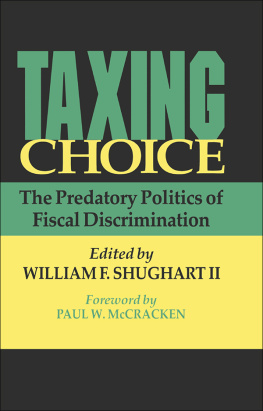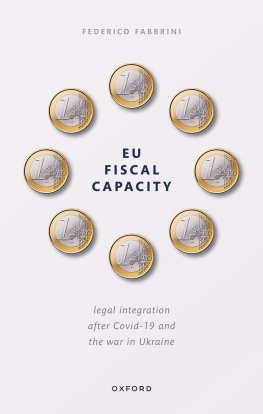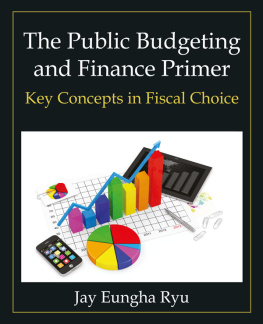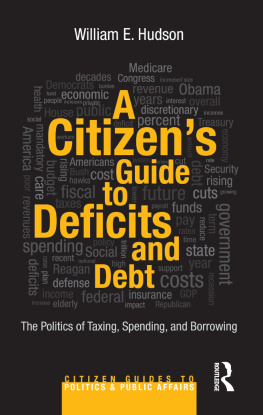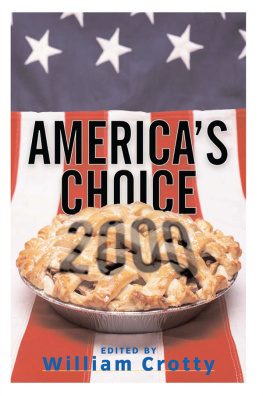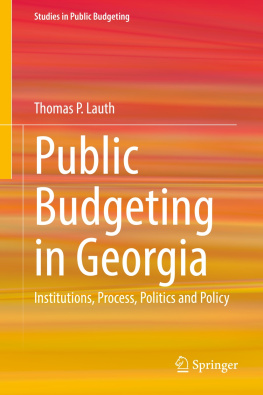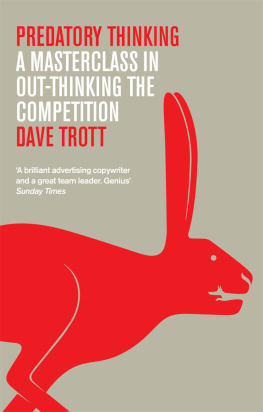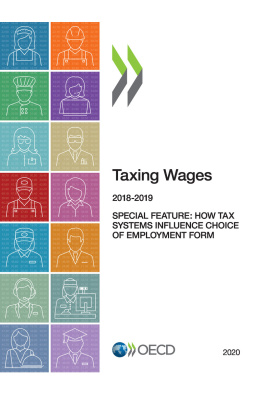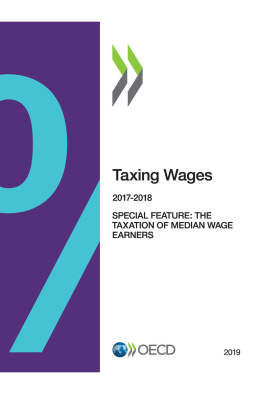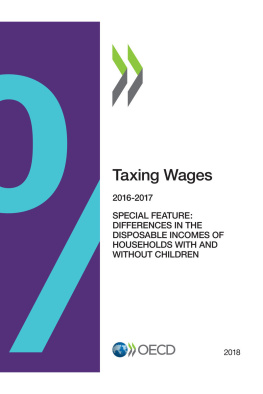First published 1997 by Transaction Publishers
Published 2017 by Routledge
2 Park Square, Milton Park, Abingdon, Oxon OX14 4RN
711 Third Avenue, New York, NY 10017, USA
Routledge is an imprint of the Taylor & Francis Group, an informa business
Copyright 1997, The Independent Institute, Oakland, CA.
All rights reserved. No part of this book may be reprinted or reproduced or utilised in any form or by any electronic, mechanical, or other means, now known or hereafter invented, including photocopying and recording, or in any information storage or retrieval system, without permission in writing from the publishers.
Notice:
Product or corporate names may be trademarks or registered trademarks, and are used only for identification and explanation without intent to infringe.
Library of Congress Catalog Number: 97-13662
Library of Congress Cataloging-in-Publication Data
Taxing choice : the predatory politics of fiscal discrimination / edited by
William F. Shughart II ; foreword by Paul W. McCracken.
p. cm.
Includes bibliographical references and index.
ISBN 1-56000-303-0 (cloth : alk. paper)
1. Excise taxUnited States. 2. TaxationPolitical aspectsUnited States. I. Shughart, William F.
HJ5707.U5T39 1997
336.200973dc21
97-13662
CIP
ISBN 13: 978-1-56000-303-8 (hbk)
ISBN 13: 978-1-56000-931-3 (pbk)
The Independent Institute is a non-profit, non-partisan, scholarly research and educational organization that sponsors comprehensive studies on the political economy of critical social and economic problems. The politicization of decision making in society has largely confined public debate to the narrow reconsideration of existing policies. Given the prevailing influence of partisan interests, little social innovation has occurred. In order to understand both the nature of and possible solutions to major public issues, The Independent Institutes program adheres to the highest standards of independent inquiry and is pursued regardless of prevailing political or social biases and conventions. The resulting studies are widely distributed as books and other publications, and publicly debated through numerous conference and media programs.
Through this uncommon independence, depth, and clarity, the Independent Institute pushes at the frontiers of our knowledge, redefines the debate over public issues, and fosters new and effective directions for government reform.
FOUNDER & PRESIDENT
David J. Theroux
RESEARCH DIRECTOR
Robert Higgs, Ph.D.
ACADEMIC ADVISORS
Stephen E. Ambrose
University of New Orleans
Martin Anderson
Hoover Institution
Herman Belz
University of Maryland
Thomas E. Borcherding
Claremont Graduate School
Boudewijn Bouckaert
University of Ghent, Belgium James M. Buchanan
George Mason University
Allan C. Carlson
Rockford Institute
Robert W. Crandall
Brookings Institution
Stephen J. DeCanio
University of California, Santa Barbara
Arthur A. Ekirch, Jr.
State University of New York, Albany
Richard A. Epstein
University of Chicago
B. Delorth Gardner
Brigham Young University
George Gilder
Discovery Institute
Nathan Glazer
Harvard University
Ronald Hamowy
University of Alberta
Steve H. Hanke
Johns Hopkins University
Ronald Max Hartwell
Oxford University
H. Robert Heller
Intl. Payments Institute
Lawrence A. Kudlow
American Skandia Life
Assurance Corporation
Deirdre N. McCloskey
University of Iowa
J. Huston McCulloch
Ohio State University
Forrest McDonald
University of Alabama Merten H. Miller
University of Chicago Thomas Gale Moore
Hoover Institution
Charles Murray
American Enterprise Institute
William A. Niskanen
Cato Institute
Michael J. Novak, Jr.
American Enterprise Institute
Charles E. Phelps
University of Rochester
Paul Craig Roberts
Institute for Political Economy
Nathan Rosenberg
Stanford University
Simon Rottenberg
University of Massachusetts
Pascal Salin
University of Paris, France Arthur Seldon
Institute of Economic Affairs, England
Julian L. Simon
University of Maryland
Joel H. Spring
State University of New York, Old Westbury
Richard L. Stroup
Montana State University
Thomas S. Szasz
State University of New York, Syracuse
Robert D. Tollison
George Mason University
Arnold S. Irebach
American University
Gordon Tullock
University of Arizona
Richard E. Wagner
George Mason University
Sir Alan A. Walters
AIG Trading Corporation
Carolyn L. Weaver
American Enterprise Institute
Walter E. Williams
George Mason University

